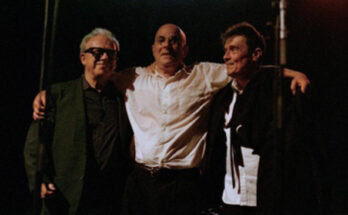Sierra Spirit, the solo project of Native American artist Sierra Spirit Kihega, has released her debut EP, coin toss, via Giant Music. Hailing from Tulsa Oklahoma, the home of both her tribes (Otoe-Missouria and Keetoowah Cherokee), the EP draws from her lived experience and cultural background as part of the Native community. Serving as a beautiful ode to the power of storytelling and honoring her Indigenous roots, the EP is released a few days ahead of Indigenous People’s Day.
coin toss tells a raw story of the honest struggles of growing up. Taking inspiration from artists such as Phoebe Bridgers, The Japanese House, and Ethel Cain – Sierra has created a unique brand of melancholy, guitar-driven, twangy indie rock.
This evening, October 10, Sierra will celebrate the release of coin toss with a record release party in her hometown Tulsa, OK at Chimera – tickets are available here. She is partnering with the local non-profit DVIS, who will have a presence at the show. OnOctober 17, Sierra will also play a show in Los Angeles at Make Out Music and tickets are here.
Sierra is also excited to share a video for the acoustic version of the EP’s “easy,” directed by American Seminole filmmaker Sterlin Harjo (Reservation Dogs). Sierra shares, “Being able to work with Sterlin, who’s been opening so many doors for our community, was an incredible experience I’ll never forget. I’m just so grateful to be a small part of the Indigenous community filling up space in film and music.” The intimate performance was shot in Harjo’s home in Oklahoma and you can watch it here. Sterlin also sat down with Sierra for a Q&A about her EP – watch that video here:
Storytelling is in Sierra Spirit Kihega’s blood. Growing up as a member of the Otoe-Missouria tribe and the Keetoowah Band of Cherokees, she spent afternoons and weekends driving around with her grandmother and visiting family on the reservation. A black coffee in one hand and the steering wheel in the other, Spirit’s grandmother imparted life lessons through ancestral stories. “A central part of our culture is storytelling, and my grandmother turned everything into a beautiful story, big or small,” Spirit says. “I wouldn’t be the writer I am today if it weren’t for listening to her.”
Though she now calls Connecticut home, Spirit’s music dwells with the red dirt of Oklahoma, where she was raised. “I’d always been a writer, but I started writing songs when I became very homesick,” she says. She missed long drives across flat stretches of arid landscape, the “insane sunsets,” and the proximity to family and community. Her debut EP, coin toss, bottles that yearning. On the absurdly catchy single “bleed you,” she brings her listeners back to the Oklahoma of her youth, incorporating banjo and slide guitar in a nod to the country music she was raised on. “Being a teen there, you’d want to go somewhere, but there’s nowhere to go, so you’d just sit in a parking lot with your friends and talk for hours,” she says.
On coin toss, Spirit renders a self-portrait in intimate detail, touching on themes of loss, addiction, and mental illness. Inspired by her favorite artists like Julien Baker and Phoebe Bridgers, Spirit’s lyrics are frank vignettes. “Blood is thicker than water, but thinner than alcohol/ I can’t stomach another crying phone call,” Spirit sings on the stirring single “televangelic.” Although the collection is personal, she stresses that the struggles she and her family have faced are not uncommon in Native communities.
“As a kid, I didn’t see an Indigenous experience reflected back at me in the media. Native people were always these outdated constructs in westerns,” Spirit says. “I want to be a voice for my community, amplifying that we’re still here. The culture is moving.”
She inherited that commitment to community from her grandmother, who worked for the Indian Health Service and spent her life nurturing her people. On the opening track “i’ll be waiting (pug),” Spirit recounts the painful experience of losing her as a teen. “How do you live a lifetime in a night?” she asks on the chorus, remembering the final hours they spent together in the hospital. Spirit grew up on Johnny Cash, and “i’ll be waiting (pug)” honors the country music her family loves. The narrative is plain spoken and arresting in its simplicity. “Last goodbye/ By your side/ ‘Til your cup of coffee’s getting cold,” Spirit sings, accompanied by a mournful pedal steel.
Details like these are wrenching, and Spirit’s eye for them makes coin toss unforgettable. “I’ve always been a very sentimental person, and holding onto things is a part of that,” she says. Her notes app is filled with little details like her grandmother’s signature cup of black coffee going cold, and she mines it whenever she goes into the studio with her producer Aaron Taos. “The most important thing for me is that the story is told,” she says. “Finding a way to structure it and condense it is the last step in the songwriting process.”
Spirit writes to memorialize people and experiences, but she writes to overcome a history of mental illness. As a kid, she was quiet and reserved which made her fear she came across as unapproachable. “I had such intense anxiety that I spent my younger years keeping to myself out of fear of being misunderstood,” she says. Years have passed since, but Spirit still fixates on those lonely formative years when she felt like a self-described “pushover” and “kicked puppy” around her peers. “Easy” crystallizes that sense of inferiority: “I’m a deer on the side of the highway you hit with your car and then drag 50 feet on your way to the bar like it’s easy/ To take a sharp turn and lose me.” It’s a mouthful of an opening delivered with the inscrutable confidence of a songwriter who no longer feels like fresh roadkill.
“When people know your heart is big and you’re kind, they will take from you until you have nothing left to give,” Spirit says. Her heart is still big, but she’s learned to protect it. On the bridge of “ghost,” she addresses a former lover who’s wasted her time: “You’re habitual, I hope you die alone.” “ghost” was among the first songs Spirit released, and its powerful conclusion signaled the arrival of a venerable new voice. When Spirit began sharing music online, she quickly found a community of fans, many of whom are fellow Indigenous creatives who found kinship in the stories Spirit told. “There are things I need to heal from and it’s important to share, because I want other people who have experienced similar things to feel less alone.”


